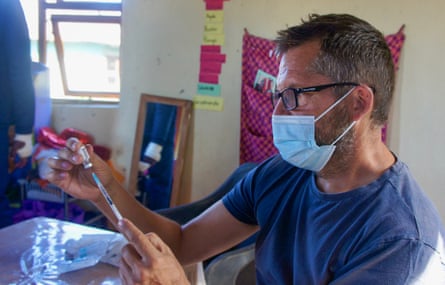An £8m prize for a breakthrough in the fight against superbugs has been awarded, after a decade-long search for a winner, to a test that can identify how to treat a urinary tract infection in 45 minutes.
The test could herald a “sea change” in antibiotic use, the judges said as they announced the winner of the Longitude prize on antimicrobial resistance (AMR).
AMR, where the drugs used to treat infections no longer work, is a growing concern. It leads to the deaths of nearly 1.3 million people worldwide annually and is predicted to cause 10 million deaths a year by 2050.
Between 50% and 60% of women will experience at least one urinary tract infection (UTI) in their lifetime, and up to half of the bacteria that cause the infections are resistant to at least one antibiotic. The infections can cause potentially fatal sepsis.
However, a lack of good, quick tests means doctors often have to diagnose an infection based on symptoms and guess which antibiotic will work. The inappropriate use of antibiotics drives resistance by giving bacteria opportunities to adapt to evade them.
The Longitude prize was established in 2014 to incentivise a “cost-effective, accurate, rapid, and easy-to-use test for bacterial infections that will allow health professionals worldwide to administer the right antibiotics at the right time”.
The winning Sysmex Astrego’s PA-100 AST system is based on technology from Uppsala University in Sweden. A 400-microlitre sample of urine is placed on a phone-sized cartridge and then into a shoebox-sized analyser unit. It can spot bacterial infection within 15 minutes, and identify the antibiotic to treat it within 45 minutes.
Previously, doctors would send a sample to a laboratory for tests with results in 24 hours, giving a turnaround time of two or three days.
Dr Tom Boyles, an infectious disease consultant at Johannesburg’s Helen Joseph hospital who was one of the judges, said most UTIs in South Africa were treated without a sample being sent off, because of time and expense.

“As a result, any patient who doesn’t have a UTI at all receives unnecessary antibiotics, and we are ‘shooting blind’ when a UTI is present, and as such, we need to use broader-spectrum antibiotics than might otherwise be necessary. If we have access to this test, we can solve both problems,” he said, adding it could be used “in many low-resource settings that can afford it and have a power supply”. He described the test in its current form as an “iPhone One”.
“It has the potential to make major strides,” he said. “I’m sure the prize money will be used to upgrade it to an iPhone 10.”
Dr Sherry Taylor, an NHS GP partner in London said access to the test would “revolutionise” patient care in the UK, where laboratory tests take “around three days”.
About a quarter of infections are resistant to older antibiotics, which have been retired from general use as a result. The test opens up the possibility that those antibiotics could be brought back.
Dame Sally Davies, a Longitude committee member, the UK’s special envoy on AMR and a former chief medical officer of England, said: “We can no longer afford ‘just-in-case’ prescribing of antibiotics.
“The Longitude prize winner lays the groundwork for a sea change in how we manage these precious medicines, where healthcare workers are supported with rapid and relevant diagnostic tests to make the best decisions for their patients.”
Mikael Olsson, a co-founder of Sysmex Astrego, said the product was being introduced in Europe, but the prize funds would be used to drive work with affiliates in Ghana, Burkina Faso and South Africa and reduce manufacturing costs.
The test costs about £25 for one cartridge in the private sector, but industry experts say public-sector adoption and high-volume production could see that drop.
Dr Katherine Keenan of the University of St Andrews in Scotland has researched UTIs in Kenya, Tanzania and Uganda. She said the numbers recorded in clinics were “the tip of the iceberg”, with many sufferers buying antibiotics at pharmacies, and that the risk of UTIs was higher in countries with poor sanitation.
Keenan said equitable access was key, with medical advances often prohibitively expensive.
However, if it became cheap enough for public health facilities or pharmacies, “there’s no reason why it couldn’t be effective and really, really, really helpful”, she said.
Source: theguardian.com



